Anorectal abscess surgery is a common procedure performed to treat an infection that forms in the tissue around the rectum and anus. The abscess is typically caused by bacteria entering the tissue through small tears or cuts in the skin lining the anal canal.
To treat the abscess, surgery is often necessary to drain the infected fluid and remove any damaged tissue. This surgical procedure is usually done under local anesthesia and can be performed on an outpatient basis.
After the surgery, patients are typically advised to follow a strict post-operative care plan to prevent complications and promote healing. Overall, anorectal abscess surgery is a safe and effective treatment option for managing this common condition.
It is essential to have a comprehensive understanding of the causes, symptoms, and treatment options for anorectal abscesses. This article will guide you through the process of preparing for and recovering from anorectal abscess surgery with valuable information provided by Dr. Valeria Simone MD, at Southlake General Surgery in Texas, USA.
Key Highlights
- Anorectal abscess surgery involves addressing infections in the anal canal and rectal area.
- Surgical techniques and anesthesia aim at patient comfort and effective treatment of anorectal abscesses.
- Post-surgery care includes sitz baths, prescription pain medicine, and a gradual return to normal activities.
- Recognizing signs of infection and seeking timely medical attention are crucial for a successful recovery.
- Long-term healing involves managing complications, following up with healthcare professionals, and resuming normal routines.
Understanding Anorectal Abscesses
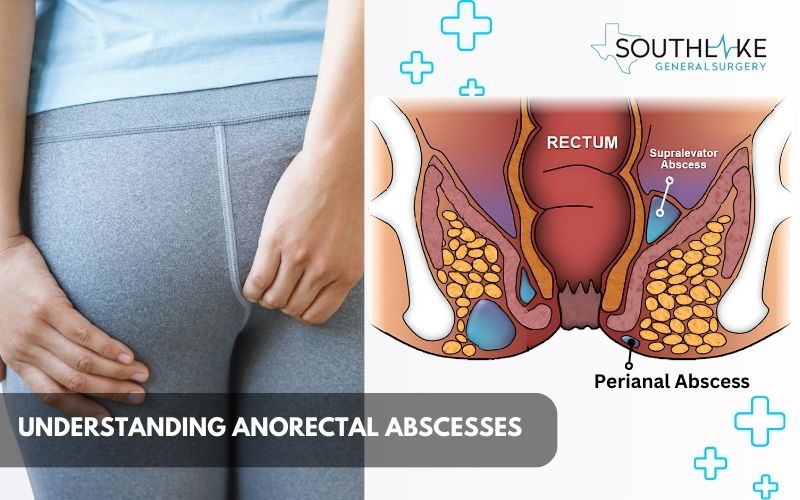
Anorectal abscesses are localized infections in the anal area, often characterized by a painful mass or swelling. These abscesses typically develop from an infected anal gland and can appear near the anal canal.
Factors such as inflammatory bowel disease or an anal fistula can predispose individuals to anorectal abscesses. Recognizing the symptoms promptly is crucial. Failure to address an anorectal abscess can result in additional complications, such as the development of a fistula.
Understanding these abscesses and diagnosing them accurately, often through an MRI, helps in timely intervention and appropriate management.
Causes and Risk Factors

Anorectal abscesses often occur due to infections in the anal glands or blockages in the anal ducts. Various factors like weakened immunity, inflammatory bowel disease, or prior anorectal surgery, can increase the risk of developing these abscesses.
Other contributors include conditions like Crohn’s disease or ulcerative colitis, leading to inflammation in the anal area.
Persistent issues with bowel movements, such as chronic constipation, can also play a role in the formation of anorectal abscesses.
If left untreated, these abscesses can progress into more complex conditions like anal fistulas.
Symptoms To Watch For

Symptoms to watch for include persistent pain in the anal area, especially during bowel movements, and swelling or redness around the rectal area. Other signs may involve:
- discharge of pus
- fever
- discomfort
If you notice these symptoms, seeking medical attention promptly is crucial to prevent complications. It is essential to be vigilant and not ignore any concerning signs to ensure timely management of your condition.
Preparing for Your Surgery with Dr. Valeria Simone

Before undergoing anorectal abscess surgery with Dr. Valeria Simone, consultation and diagnosis will be conducted to assess your condition. Expect clear instructions on pre-procedural measures and what to anticipate during the surgery.
General anesthesia will be administered to ensure patient comfort. Bring a list of current medications and any relevant test results for a smoother process.
Dr. Valeria Simone’s expertise will guide you through this crucial phase, ensuring you are well-prepared and informed for the upcoming procedure.
Consultation and Diagnosis
Consultation and diagnosis are vital steps before anorectal abscess surgery. During your consultation, Dr. Valeria Simone will review your medical history and symptoms carefully. She may conduct a physical examination or order tests like a CT scan for accurate diagnosis.
Based on these findings, she will discuss the best course of action with you. It is of utmost importance to maintain open communication with your healthcare provider regarding any concerns or inquiries you may have throughout this process.
This initial step is key to developing a personalized treatment plan for your condition.
What to Expect Before the Procedure
Before undergoing an anorectal abscess surgery, you can anticipate a consultation and diagnosis session with Dr. Valeria Simone. This typically involves discussing your medical history, current symptoms, and any relevant test results.
You will receive detailed information about the procedure, preoperative preparations, and guidelines to follow before surgery, including healthwise advice. Expect to be informed about anesthesia options and any prescription medications you may need to take.
Ensuring you are well-prepared mentally and physically is a key part of your treatment plan.
The Surgery Experience at Southlake General Surgery, Texas
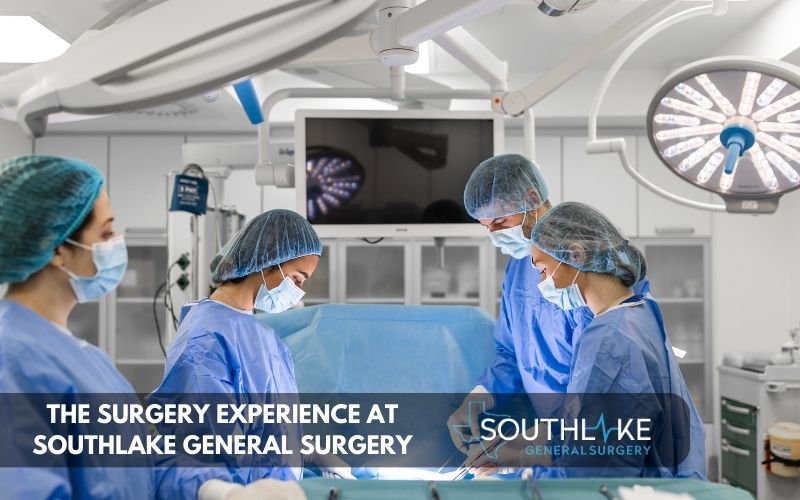
Patients can expect state-of-the-art surgical procedures at Southlake General Surgery, Texas, coupled with individualized attention. Under general anesthesia, the procedure ensures patient comfort throughout.
The skilled medical team performs incisions to drain the abscess, followed by appropriate wound care and monitoring. Patient well-being is prioritized with pain management and post-operative instructions for a smooth recovery.
Surgical Techniques and Innovations
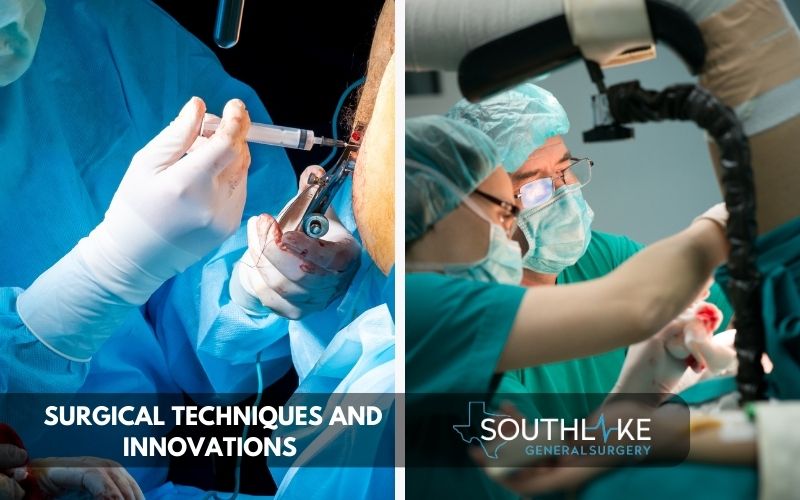
Advanced surgical techniques and innovations enhance patient outcomes in anorectal abscess surgeries. Procedures may include incision and drainage to remove the pus pocket, minimizing discomfort.
Some innovative approaches involve the use of setons or fistulotomies to address associated anal fistulas and perirectal abscesses.
General anesthesia is typically used to ensure patient comfort during the outpatient procedure. Dr. Valeria Simone at Southlake General Surgery in Texas stays abreast of the latest advancements in anorectal abscess surgery, including perianal abscess surgery, to ensure optimal patient care.
Anesthesia and Patient Comfort
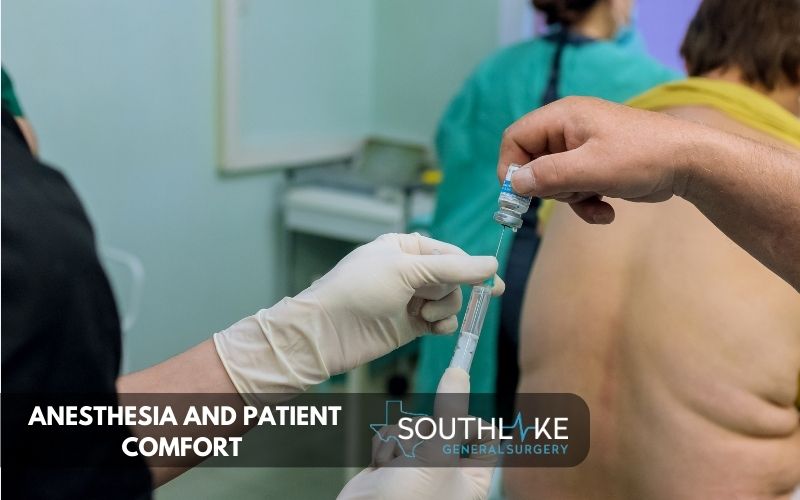
General anesthesia is commonly used during anorectal abscess surgeries to ensure patients remain unconscious and pain-free throughout the procedure. With this method, the patient can relax and not feel a thing during the operation.
Your healthcare provider will carefully monitor you while under anesthesia to maintain your well-being. Patient comfort is a key priority during the surgery, and measures are in place to ensure you have a smooth and pain-free experience while under the effects of anesthesia.
Post-Surgery Care and Recovery

After anorectal abscess surgery, adhere strictly to your healthcare provider’s postoperative care instructions.
- Manage pain with prescribed medication.
- Always change the dressings as instructed and make sure the incision site is dry.
- Wearing a gauze bandage and replacing it daily will help stop the area from rubbing or bleeding.
- To keep the surgical site from getting inflamed, do not engage in any heavy lifting.
- To avoid constipation, eat a high-fiber diet and drink plenty of water.
It is important to note that no stitches are needed for drained abscesses. However, if the pus collection is deep, you may need to stay in the hospital longer for pain control and nursing care of the abscess drainage site.
Seek immediate medical attention if you notice any of the following: worsening pain, swelling, or discharge. Make sure to schedule follow-up appointments so your doctor can track your recovery progress.
Immediate Aftercare Instructions
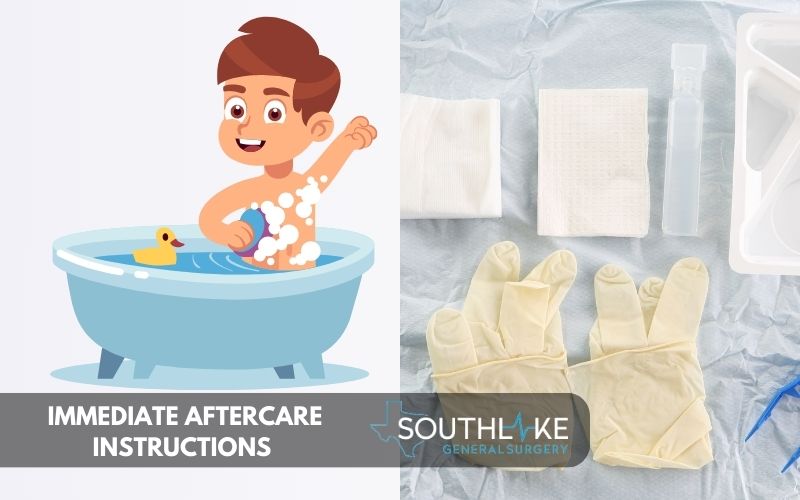
After anorectal abscess surgery, follow these immediate aftercare instructions. Empty the bowel gently, avoid straining, and take prescribed pain medicine, such as Hydrocodone.
To alleviate pain, take sitz baths and use gauze to keep the area clean. Avoid heavy lifting or strenuous activity.
To facilitate bowel movements following surgery, sit on a little step stool to elevate your feet off the floor, bend your hips, and lower your pelvis into a squatting position.
If you’re experiencing severe pain, fever, or excessive bleeding, it’s important to contact your healthcare provider immediately.
Adhere strictly to the prescribed medications, avoiding aspirin or aspirin-containing products, and care routine for a smooth recovery. Remember, your health is a priority.
Long-term Healing and Management
After anorectal abscess surgery, long-term healing and management are crucial. To ensure a successful recovery, it is crucial to diligently follow the instructions provided by your healthcare provider.
- Complete antibiotics and pain medication courses and schedule follow-up appointments.
- Keep the rectal area clean and dry and watch for any signs of infection.
- Incorporate a high-fiber diet to prevent constipation and avoid straining during bowel movements.
- Regular exercise and maintaining good hygiene practices will aid in a smooth recovery process.
Potential Complications and How to Avoid Them
Possible complications after surgery for an anorectal abscess may include infection, delayed healing, or recurrence. Make sure to adhere to all post-operative instructions, especially those about wound care and medication. This will help avoid these complications.
- Any signs of infection like increased pain, redness, or discharge should prompt immediate medical attention.
- Maintaining good hygiene, avoiding constipation, and adhering to your healthcare provider’s guidance are key preventive measures.
- Regular follow-up appointments and communication with your healthcare team also play a crucial role in ensuring a smooth recovery process.
Recognizing Signs of Infection
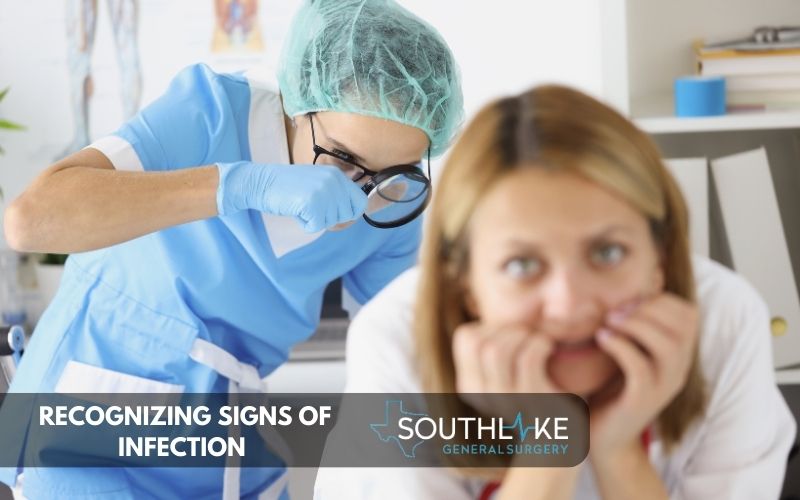
Signs of infection following an anorectal abscess surgery are vital to recognize promptly.
Watch out for increased pain, redness, or warmth around the surgical site, along with any unusual discharge or foul odor. Elevated fever or chills, persistent swelling, or worsening discomfort should not be ignored.
If you experience these symptoms, contact your healthcare provider immediately to prevent any potential complications. A smooth recovery process is greatly enhanced by early detection and proper treatment.
When to Seek Further Medical Attention
If you experience persistent or worsening pain, fever, chills, or difficulty with bowel movements after anorectal abscess surgery, contact your healthcare provider promptly.
Additionally, if you notice increased swelling, redness, or discharge from the surgical site, or have difficulty controlling your blood glucose if you are diabetic, seek medical attention from your healthcare provider immediately.
Any new or severe symptoms outside normal discomfort warrant medical evaluation to prevent complications. It’s crucial to address any concerns promptly for optimal post-operative care and management.
Outlook
After an anorectal abscess surgery, the outlook is generally positive with proper care. Most patients experience relief from the symptoms that led to the surgery.
Following post-operative instructions diligently can significantly impact recovery. Ensure that you’re making good progress in your recovery by showing up to your follow-up appointments.
In case of any mild pain or other unusual symptoms or concerns, do not hesitate to contact your healthcare provider promptly.
In patients who undergo anorectal abscess surgery, the prognosis is good with careful post-operative care, which includes watching for the formation of a fistula connecting the previous abscess to the outside of the body.
Make An Appointment

To schedule a consultation or inquire about anorectal abscess surgery, please call +1 (817) 748-0200 to reach Dr. Valeria Simone MD, at Southlake General Surgery in Texas, USA.
Dr. Simone, a skilled healthcare professional, specializes in anorectal conditions and can guide you through the treatment process.
Whether you require surgery or simply seek a consultation, Dr. Simone and her team of professionals give you comprehensive care tailored to your specific requirements. Feel free to reach out to start your path to improved wellness and health.
Frequently Asked Questions
How long is the recovery period?
Recovery periods for anorectal abscess surgery vary but typically range from a few weeks to a couple of months. Factors affecting recovery include the individual’s overall health, the extent of the abscess, and adherence to post-surgery care instructions.
How successful is anorectal abscess surgery?
Anorectal abscess surgery boasts high success rates, typically resolving the condition effectively. Success is influenced by timely diagnosis, appropriate surgical techniques, and post-operative care. Understanding these factors can help patients prepare for a positive outcome.
Medically Reviewed By: Dr. Valeria Simone MD
Board-certified General Surgeon at Southlake General Surgery, Texas, USA.
Follow us on Facebook and YouTube.
References:
- Tarasconi, Antonio, et al. “Anorectal emergencies: WSES-AAST guidelines.” World Journal of Emergency Surgery, vol. 16, no. 1, Sept. 2021, https://doi.org/10.1186/s13017-021-00384-x.
- Abscess and Fistula Expanded Information | ASCRS. fascrs.org/patients/diseases-and-conditions/a-z/abscess-and-fistula-expanded-information.
- Sigmon, David F., et al. “Perianal Abscess.” StatPearls – NCBI Bookshelf, 12 June 2023, www.ncbi.nlm.nih.gov/books/NBK459167.
- Lu, Dan, et al. “Relationship Between Body Mass Index and Recurrence/Anal Fistula Formation Following Initial Operation for Anorectal Abscess.” Medical Science Monitor, vol. 25, Oct. 2019, pp. 7942–50. https://doi.org/10.12659/msm.917836.
- Hyman, Neil. “ANORECTAL ABSCESS AND FISTULA.” Primary Care Clinics in Office Practice, vol. 26, no. 1, Mar. 1999, pp. 69–80. https://doi.org/10.1016/s0095-4543(05)70102-0.
- Wright, William F. “Infectious Diseases Perspective of Anorectal Abscess and Fistula-in-ano Disease.” The American Journal of the Medical Sciences, vol. 351, no. 4, Apr. 2016, pp. 427–34. https://doi.org/10.1016/j.amjms.2015.11.012.

